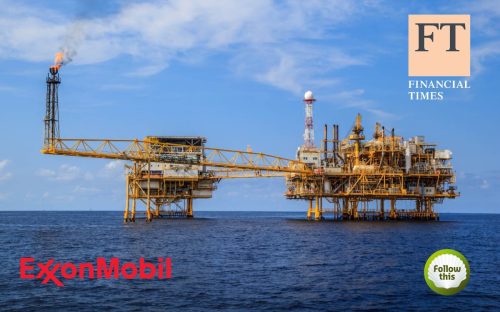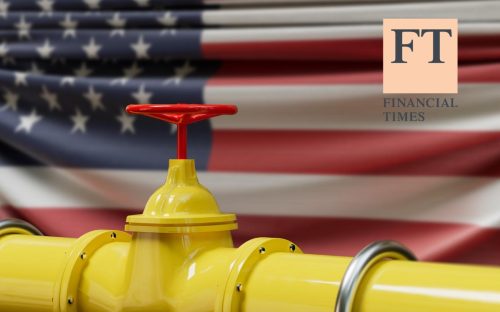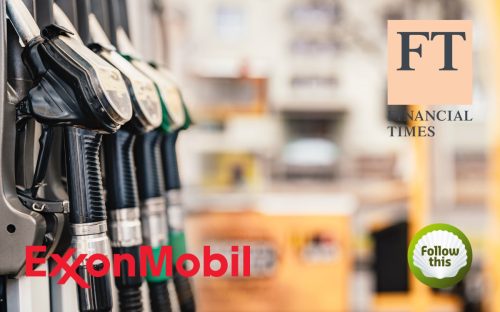De Follow This klimaatresolutie kreeg in Noorwegen de steun van 27 % van de particuliere (*) aandeelhouders van Equinor. In 2019 kreeg dezelfde resolutie 12% van de stemmen.
“Dit is een grote overwinning in de strijd tegen klimaatverandering,” zegt Mark van Baal van Follow This. “Beleggers laten steeds meer hun tanden zien, vooral tegenover de bedrijven die het klimaatakkoord van Parijs kunnen maken of breken. Deze beleggers laten zien dat ze vrijblijvende ambities niet meer accepteren, maar concrete actie om emissies te verlagen willen zien.”
In 2019 was 12% van de stemmen genoeg om Equinor te bewegen een klimaatambitie op te stellen.
Dinsdag 19 mei staat dezelfde resolutie op de agenda van de aandeelhoudersvergadering van Shell (en 27 mei bij Total). “We hopen dat beleggers bij Shell consequent stemmen. Shell heeft net als Equinor slechts een vrijblijvende klimaatambitie zonder te kunnen garanderen dat de investeringen fundamenteel verschuiven van fossiel naar duurzaam en de emissies omlaag gaan.”
Follow This vroeg ook aan Equinor of het bedrijf kon garanderen dat het in 2030 minder CO2 uitstoot dan in 2019 en dat het bedrijf in 2030 meer investeert in hernieuwbare energie dan in fossiele brandstoffen. Volgens het Intergovernmental Panel on Climate Change (IPCC) zijn lagere emissies en hogere investeringen in duurzame energie in 2030 voorwaarden om de Parijs-doelen te halen. Beide vragen werden niet beantwoord.
(*) particulier aandelen die niet in handen zijn van de Noorse overheid, grootaandeelhouder met tweederde van de aandelen. De Noorse overheid stemde tegen de klimaatresolutie. “Het is onbegrijpelijk dat de Noorse staat, die het Klimaatakkoord van Parijs heeft getekend, tegen klimaatdoelen bij Equinor stemt,” reageert Van Baal.
Stemuitslag en berekeningen vind je hieronder.
PRESS RELEASE
Votes for Follow This climate resolution at Equinor double to 27%, despite company’s new climate ambitions
- Follow This climate targets resolution received 27% of the non-governmental votes (up from 12% in 2019)
- Majority shareholder, the Norwegian State, signatory of the Paris Climate Agreement, still voted against Paris-aligned climate targets for Equinor
- Equinor didn’t commit to absolute emissions reductions by 2030 (in response to questions of Follow This)
A significant/growing group of investors is not satisfied with Equinor’s new climate ambition and voted for the Follow This climate resolution at the Equinor’s AGM today (14 May). “These voting results are a win for the climate. More and more investors want oil majors to really change, instead of just publishing non-binding ambitions.”
“We hope these votes will compel Equinor to shift investments away from fossil fuels to renewables to actually achieve the Paris Agreement,” says Mark van Baal, founder of Follow This, the group of green shareholders that filed the climate targets resolution. “27% of non-governmental votes is a very strong signal from investors – often, 99% votes with management.”
“Last year, support for our resolution compelled Equinor to set a climate ambition. But it’s 2020 now. We don’t have time for another round of discussions. What investors need to hear is that emissions will go down and investments in renewable energy will go up within this decade – and today Equinor failed to provide that reassurance. We need these oil majors, who can make or break the Paris Climate Agreement, to act now. We thank the investors who supported our resolution.”
Equinor won’t commit to absolute emissions reductions by 2030
Despite announcing a new climate ambition last month, Equinor won’t guarantee that its new ambition will lead to the necessary actions to achieve the goals of the Paris Climate Agreement.
According to IPCC scenarios, to achieve the goals of the Paris Climate Agreement, by 2030 investments in renewables should fundamentally increase and absolute emissions should decrease, compared to 2019 levels.
In response to questions from Follow This during the AGM today, Equinor simply did not answer whether it will satisfy these two requirements to achieve the Paris Climate Agreement.
The company’s investment pipeline is currently 95% vested in new fossil fuels and Equinor didn’t give shareholders an answer to indicate whether the company’s new climate ambition will deliver:
- a shift in investments by 2030, and
- a decrease in emissions by 2030
Both are imperatives to achieve the goals of the Paris Climate Agreement.
“It’s telling that Equinor won’t give any guarantee to shareholders that its new ambition will actually lead to the investments and emissions reductions that are needed to achieve the goals of the Paris Climate Agreement,” says Mark van Baal, founder of Follow This.
Climate heroes
“The climate heroes of today are the institutional investors that voted for the Follow This climate resolution.” continues Van Baal. “They are the change agents of oil and gas companies. By voting for the same climate resolution, these progressive investors have already compelled Shell, Equinor, and BP to set climate ambitions 2017, 2018, and 2019. Today they urged Equinor to commit to the Paris Climate Agreement, and invest accordingly.”
Votes
The Follow This climate resolution (resolution # 9) received 27% of the non-governmental votes. For most resolutions, 99% votes with management. Since two thirds of the shares are in the hands of the Norwegian government, which voted with management, the climate resolution got 3.2 % of total votes cast. “We fail to understand that a government that signed the Paris Climate Agreement voted against a climate resolution that requests commitment to the Paris Climate Agreement.”
“This is a significant number of votes, representing investors with billions of euros in shares,” says Mark van Baal of Follow This. “We hope the board of Equinor (and their biggest shareholder, the Norwegian government) get the message that their reluctance to act is not accepted anymore in 2020.”
Last year, the votes of a minority of 12% of progressive investors were enough to compel Equinor to set a climate ambition.
Shareholders change the world
“Most oil majors have become more powerful than many governments.Only their shareholders can change these multinationals.”
Rationale investors
“More and more institutional investors want all companies they have shares in to commit to Paris, in order to protect all their assets.” Van Baal said. “They foresee that they cannot make a decent return on their capital in a world economy disrupted by devastating climate change.”
“Climate change will stay on the agenda of Equinor, its shareholders and in the media and we will make sure it stays that way until the energy transition is complete. Today’s results brought us one step closer to achieving our mission: to ensure that the oil and gas industry makes instead of breaks the Paris Climate Agreement.”
Calculation
Votes in favour of the Follow This resolution were 81,671,068 of the 304,918,631 non-governmental votes cast (27%).
The Norwegian government owns 67% (2,236,903,016) of all Equinor shares and voted with management, meaning the percentage of votes for the resolution was 3,2 % out of the total votes cast.
Source: https://www.equinor.com/en/about-us/annual-general-meeting.html
STATEMENT AND QUESTIONS FOLLOW THIS AT EQUINOR AGM 14 May 2020
Chairman, Mr. Sætre, directors, and shareholders,
Equinor jumped over its shadow after the AGM in 2019. On 6 February 2020, Equinor set a climate ambition.
We welcome this ambition, because it includes emission reductions of energy products, the so-called Scope 3 emissions. A year ago, at the same occasion in Stavanger, Scope 3 was the elephant in the room that the board did not want to talk about. Scope 3 was the reason that the board rejected our resolution that supports Equinor to set Paris-aligned targets for all emissions. “Our activities do not include direct engagement with end users of products,” the directors stated in the board’s response.
We thank the board of Equinor for crossing the Rubicon on Scope 3, and we thank the investors that supported such a step by voting for our climate targets resolution in 2019. Equinor’s move showed once again that a minority of responsible shareholders drives change.
FIVE RESOLUTIONS WITH IDENTICAL REQUESTS
Paris-aligned targets for all emission (Scope 1, 2, and 3; short-, medium-, and long-term)
Company: Equinor
Date of the AGM: 14 May
Climate Targets resolution: “Shareholders support Equinor to set and publish targets that are aligned with the goal of the Paris Climate Agreement (Scope 1, 2, and 3; short-, medium-, and long-term; and to be reviewed regularly in accordance with best available science). You have our support.”
Filed by: Follow This (lead-filer) and ACCR (co-filer)
Board’s voting recommendation: Against.
Argument board: “The board is of the opinion that the company’s climate strategy is supporting a sustainable and balanced transition to a low carbon society. Consequently, the board of directors recommends the annual general meeting to vote against the proposals from the shareholders.” (the same response to as to five other, prescriptive, shareholder proposals (item 9-14))
Company’s Climate ambition:
- reduce the net carbon intensity, from initial production to final consumption, of energy produced by at least 50% by 2050 [Scope 1, 2, and 3]
- grow renewable energy capacity tenfold by 2026, developing as a global offshore wind major, and
- strengthen its industry leading position on carbon efficient production, aiming to reach carbon neutral global operations by 2030 [Scope 1 and 2].
Vote recommendations:
ISS: For
Rationale: “A vote FOR this proposal is warranted as the setting and publication of targets would aid shareholders in understanding the company’s assessment of how it could reduce its carbon footprint in alignment with greenhouse gas reductions necessary to achieve the Paris Agreement goal of maintaining global warming well below 2 degrees Celsius.”
Glass Lewis: Against
Rationale: not seen by Follow This
Company: Shell
Date of the AGM: 19 May
Climate Targets resolution: “Shareholders support the company to set and publish targets that are aligned with the goal of the Paris Climate Agreement (Scope 1, 2, and 3; short-, medium-, and long-term; and to be reviewed regularly in accordance with best available science). You have our support.”
Filed by: Follow This (lead-filer) and ACCR (co-filer)
Board’s voting recommendation: Against.
Argument board: “unnecessary and potentially counter-productive […] Shell has a clear ambition to help decarbonise the energy system, in line with the Paris Agreement […] This approach provides […] flexibility.”
Company’s Climate ambition:
- seeking to be net zero on all the emissions from the manufacture of all our products by 2050 at the latest [Scope 1 and 2]
- to reduce the Net Carbon Footprint of the energy products we sell by 65% by 2050 [Scope 1, 2, and 3]
- working with our customers to address the emissions which are produced when they use the fuels they buy from Shell [Scope 3]
Company: Total
Date of the AGM: 29 May
Climate Targets resolution: the resolution aims to have the bylaws amended as follows:
“The management report will contain […] the strategy of the Company as defined by the Board of Directors to align its operations with the objectives of the Paris Agreement, and in particular with Articles 2.1 (a) and 4.1 thereof, specifying (i) an action plan with interim milestones to set absolute reduction targets for the medium and long term that incorporate direct or indirect greenhouse gas (GHG) emissions from the Company’s operations relating to the production, processing and purchase of energy products (Scopes 1 and 2), and the end- use by customers of products sold (Scope 3) and (ii) how the Company intends to achieve these objectives.”
full text on the website of Meeschaert
Filed by: Meeschaert (lead-filer), Actiam and group of investors
Board’s voting recommendation: Not published yet.
Company’s Climate ambition: Three major steps to get Total to Net Zero:
- Net Zero across Total’s worldwide operations by 2050 or sooner (scope 1+2)
- Net Zero across all its production and energy products used by its customers in Europe by 2050 or sooner (scope 1+2+3)
- 60% or more reduction in the average carbon intensity of energy products used worldwide by Total customers by 2050 (less than 27.5 gCO2/MJ) – with intermediate steps of 15% by 2030 and 35% by 2040 (scope 1 + 2 + 3)
Total currently allocates more than 10% of its Capex to low carbon electricity [and 20% in 2030], the highest level among the Majors.
Companies: Santos and Woodside Petroleum
Dates of the AGMs: 3 April (Santos), 30 April (Woodside Petroleum)
Equinor
Climate Targets resolutions: “Shareholders request the Board disclose, in annual reporting from 2021:
1. Short-, medium- and long-term targets for reductions in our Company’s Scope 1, 2 and 3 emissions (Targets) that are aligned with articles 2.1(a) and 4.1 of the Paris Agreement (Paris Goals);
2. Details of how our Company’s exploration and capital expenditure, including each material investment in the acquisition or development of oil and gas reserves, is aligned with the Paris Goals; and
3. Details of how the Company’s remuneration policy will incentivise progress against the Targets.”
Filed by: ACCR
Board’s voting recommendation: Against
Vote recommendations:
ISS: For
Glass Lewis: For
Votes: 43% (Santos), 50.16% (Woodside).
ANALYSES of current climate ambitions
Summary, why your votes for climate targets matter:
· Equinor, Shell, and Total do not have medium- or long-term targets, and they advise against setting targets in line with the Paris Climate Agreement,
· companies’ long-term ambitions are not in line with the Paris Climate Agreement,
· companies’ investments are not in line with a well-below-2°C-pathway, and
· even if these companies were to have Paris-aligned targets, they need your support to stay committed to these targets in the decades to come.
Net absolute emissions reduction according to IPCC scenarios:
The goal of the Paris Climate Agreement is to limit global warming to well below 2°C above pre-industrial levels, to aim for a global net-zero emissions energy system, and to pursue efforts to limit the temperature increase to 1.5°C.
To reach that goal, the IPCC special report Global Warming of 1.5°C (2018) indicates that net absolute energy-related emissions should be reduced by approximately 70% * (2°C) to 100% ** (1.5°C) by 2050, relative to 2016.
* 2°C: the median pathway of the IPCC Lower-2°C pathway group (54 pathways limiting peak warming to below 2°C during the entire 21st century with greater than 66% likelihood) indicates an absolute emissions reduction of CO2 from fossil fuels and industry (net) of approximately 70% by 2050, relative to 2016 (IPCC special report Global Warming of 1.5°C, 2018, table 2.4. page 119).
** 1.5°C: the IPCC emphasized that climate-related risks are significantly higher at 2°C than at 1.5°C, and that limiting warming to 1.5°C would require CO2 emissions to reach net zero by 2050 (IPCC special report Global Warming of 1.5°C).
Net absolute emissions reductions resulting from companies’ net relative reductions ambitions:
Introductory remark: from relative to absolute emissions
Equinor, Shell, and Total have net relative emissions reduction ambitions, whereas Paris demands net absolute emissions reductions. To calculate absolute emissions, we need to know the growth of energy demand. While the companies do not offer an expected growth rate of the energy demand, we use Shell’s Sky scenario, which predicts a growth of 40% by 2050.
Equinor
· Equinor’s ambition is to reduce the net carbon intensity by at least 50% by 2050. However, halving the net carbon intensity in a growing energy system will not lead to a level of absolute net emissions reduction necessary to actually achieve the goal of the Paris Climate Agreement, and this is therefore not on a well-below-2°C pathway.
· Equinor’s ambition to reduce the Net Carbon Footprint by 50% combined with a growth of 40% results in an absolute net emission reduction of around 30%, whereas 70-100% is required (as set out above).
· With the climate targets resolution, shareholders support Equinor’s first crucial step to include the reduction of the emissions of its products (Scope 3) in its ambition and support Equinor to take the next steps: advance this ambition to short-, medium-, and long-term targets that are aligned with a well-below-2°C-pathway, and invest accordingly.
Shell
· On 16 April 2020, Shell’s ambition and narrative changed to the following: Shell aspires to reduce its Net Carbon Footprint by 65% by 2050 and help customers to offset the remaining emissions, leading the company to claim to be a net zero emissions company by 2050. This ambition is more ambitious than the ambitions of Equinor and Total.
· Shell’s ambition to reduce the Net Carbon Footprint by 65% combined with a growth in global energy demand of 40% (Shell’s Sky scenario) would result in a net absolute emissions reduction of around 50%, whereas 70-100% is required (as set out above).
· Even if the growth were to be smaller, we can assume that energy demand is to grow in the coming decades (as a result of a growing population with increasing prosperity). Therefore, the net relative emissions reductions should be significantly higher than net absolute emissions reductions required by the IPCC. Thus, a net relative emissions reduction of 65% is not enough to reach a net absolute emissions reduction of 70-100%.
· Shell’s customers have to offset the gap between Shell’s ambitions and Paris’s requirements by, for example, building massive and complex industrial infrastructure for carbon capture and storage factories and by massively planting forests. Depending on the growth of energy demand, these offsets need to have the size of 35% (no growth of global energy demand) to around 50% (40% growth of global energy demand) of the emissions in 2017.
· The non-committal ambition to work with customers to help them offset excess emissions is in our view even more non-committal than the company’s own ambitions and will not give investors the clarity and confidence that the goal of the Paris Climate Agreement will actually be achieved.
· Our support for Paris-aligned targets for all emissions (Scope 1, 2, and 3) remains unchanged, allowing the company to meet an increasing demand for energy while reducing GHG emissions to levels compatible with the global intergovernmental consensus specified by the Paris Climate Agreement.
Total
· Total’s ambition to reduce its carbon intensity by 60% (a relative metric) combined with an estimated growth of energy demand of 40% results in an absolute net emission reduction of around 44% by 2050, whereas absolute emissions reduction of 70-100% is required according IPPC scenarios.
· Total’s pledge to allocates more than 10% of its investments to low carbon electricity [and 20% in 2030] means little, while ‘low carbon’ most of the time equals ‘natural gas’ in Total’s dictionary.
Medium-term ambitions
There are no realistic IPCC scenarios # that allow for growth in oil and gas production in this decade, because all scenarios call for a substantial reduction in absolute energy-related CO2 emissions: a reduction in absolute emissions (gross as well as net).
# values of median and interquartile range (from 25th and 75th percentile) of available IPCC scenarios (varying from 1.5°C-low-OS to Higher-2°C) all show significant lower gross CO2 from fossil fuel and industry in 2030 compared to 2019 (IPCC special report Global Warming of 1.5°C (2018), table 2.4. page 119).
Conclusion
The current medium-term and long-term emissions reduction ambitions of Equinor, Shell, and Total are not only non-committal (lacking concrete targets) but also insufficient to reach the goal of the Paris Climate Agreement.











